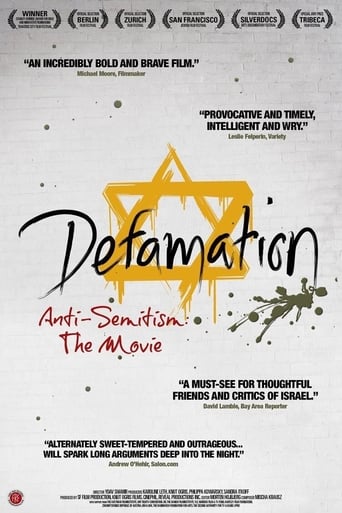
Intent on shaking up the ultimate 'sacred cow' for Jews, Israeli director Yoav Shamir embarks on a provocative - and at times irreverent - quest to answer the question, "What is anti-Semitism today?"
Similar titles
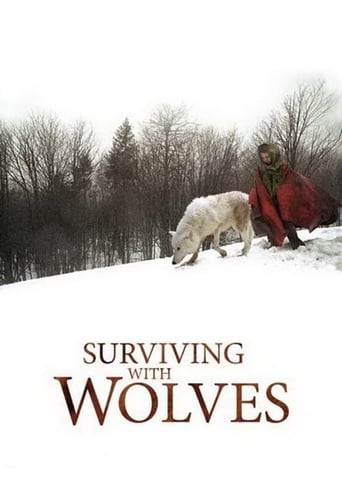
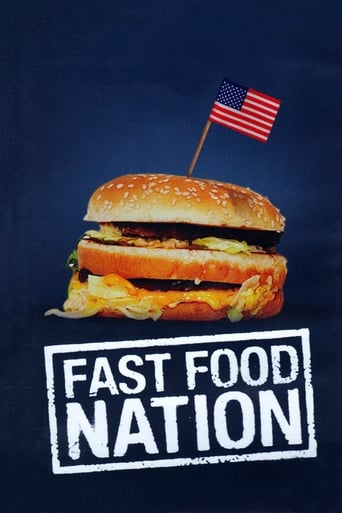
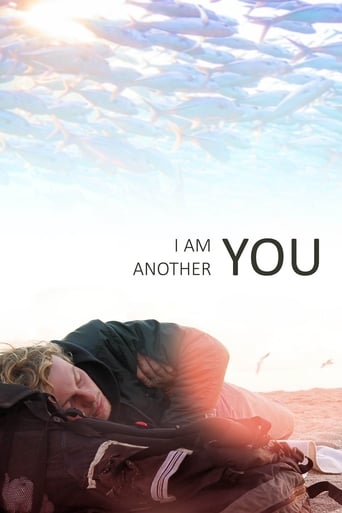
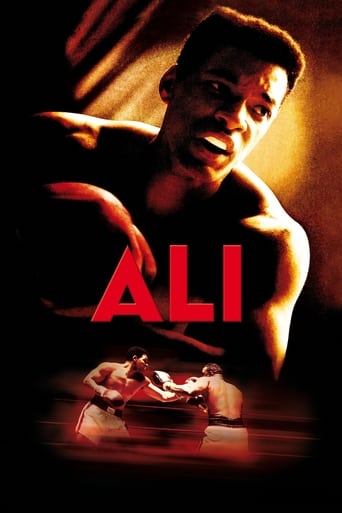
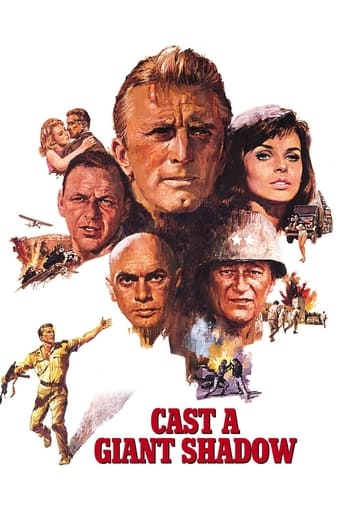
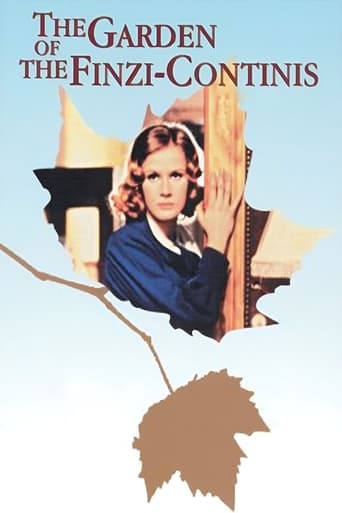

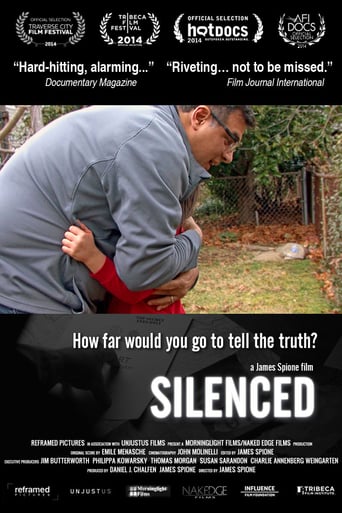
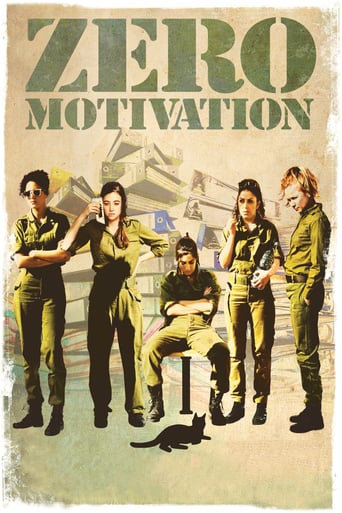
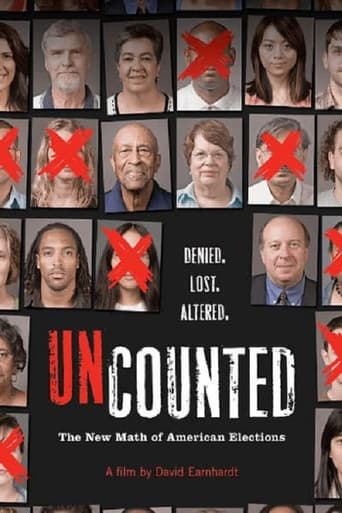
Reviews
Sadly Over-hyped
How sad is this?
A lot more amusing than I thought it would be.
An old-fashioned movie made with new-fashioned finesse.
The UN voting record is the most disturbing proof that antisemitism is alive and faring well. Therefore the bottom line of this movie is pretty simple: The director went to the wrong places to find any antisemitism. He just meets simple ignorance. And antisemitism goes much beyond common people naiveness.Anyway, the movie is quite fun to watch (the Israeli accent is fun) and, even if it just scratches the surface of the issue, it raises some good questions about how to educate new generations about the Shoah (the holocaust) and more generally how should Jews view and identify themselves. It was the french philosopher Jean Paul Sartre who said that Jewish identity was somehow defined by antisemitism. It is true that the creation of Israel has a lot to do with antisemitism, and obviously it plays a big role in Jewish identity. But if being a Jew is reduced to this, then, as an interviewee said in the movie, "we're never going to be a normal people".But this is the most complex quest. The everlasting feeling of persecution must, at some point, end. Or else it will turn into and unjustified need of vengeance (as seen in the talks of one of the girls in the movie). But, as Elie Wiesel said, "Only the guilty are guilty. Their children are not.". Nevertheless "Never forget" is the most important teaching, not only for Jews, but for everyone. And this plays a critical role in, for instance, the Iranian atomic bomb issue.
As a Jew born and raised in Israel, filmmaker Yoav Shamir claims never to have experienced anti-Semitism firsthand. So off he goes to find some. And what he does find often surprises him – and us. Indeed, his remarkably provocative and nuanced film "Defamation" becomes more of an examination of the internecine warfare occurring amongst Jews themselves than of gentiles' attitudes towards Jews.For instance, Shamir accompanies a group of Israeli youth on a trip to Poland, the goal of which is to help open the eyes of the youngsters to the realities of the Holocaust. Yet, the kids have been so primed by their leaders to fear the worst from the local citizenry that they wind up seeing anti-Semitic attitudes where none may actually exist. And it is a testament to Shamir's commitment to the truth and his integrity as a documentarian that he allows such potentially controversial and meme-undermining scenes to remain in his film. In a similar fashion, when he interviews a rabbi in the Crown Heights section of Brooklyn – a neighborhood notorious for its long-running tension between Jews and African–Americans – the religious leader, much to Shamir's amazement, actually accuses the heads of the Anti-Defamation League of having professional motives for ascribing anti-Semitism to incidents and crimes where that may not in fact be a primary factor – or a factor at all.If nothing else, Shamir provides a balanced view on his subject – though if anything he tends to give a somewhat more sympathetic hearing to the people in the Jewish community who take on organizations like the ADL for their more conservative views on anti-Semitism and the State of Israel. For instance, Shamir interviews Norman Finklestein, a highly controversial Jewish professor at the DePaul University in Chicago, who argues that a certain part of the Jewish establishment makes "cynical use of the Holocaust," and that whenever any policy or action performed by Israel is legitimately criticized, the underlying cause somehow always gets attributed to anti-Semitism – a condition he refers to as "pathological narcissism." For giving voice to this viewpoint, Finklestein has been labeled a "self-hating Jew," a "Holocaust-denier" (even though he lost his parents in concentration camps), and a "madman." He eventually lost his position at the university – due to pressure from the Jewish lobby he claims – and was denied entrance into Israel on the grounds of being a potential "security hazard.' Abraham Foxman, the National Director of the ADL who gets interviewed extensively for the film, responds by saying that actual anti-Semites use criticism of Israel as an excuse to legitimately articulate their hatred of Jews – to give that hatred a patina of social respectability as it were.Shamir lays out the conflict between the Jewish left and the Jewish right in the United States – the former calling for peace between Israel and the Palestinians and accusing the right of favoring Israel's interests over those of the United States, and the latter working to keep Israeli issues front and center in the national dialogue. And back and forth it goes.Of course, this is not to in any way suggest that anti-Semitism doesn't exist in the world today or that Shamir never finds any evidence of it in his searching. For instance, he investigates a case of rocks being thrown at a Brooklyn school bus filled with Jewish children and another instance of a knife-wielding man stabbing people in a Moscow synagogue. Yet, interestingly, even many of the Jewish people involved with that latter incident pooh-pooh the idea that anti-Semitism was the cause and even go so far as to castigate Jews in general for using anti-Semitism as a convenient scapegoat for their own failures or misfortunes in life.Although he doesn't seem to have started out with that intention, Shamir has produced an amazingly provocative and controversial work, one that is guaranteed to get tempers flaring and people talking on both sides of the issue. And it's a much-needed eye-opener for anyone regardless of viewpoint.
'Hashmatsa' ('Defamation') by Israeli director Yoav Shamir dares to attack one of the sacred cows of Israel and of the Jewish people thinking - how it reacts to antisemitism around the world, how it looks at the evil of the Holocaust, and how young generations are being educated in Israel with respect to these painful and fundamental issues.The result is mixed I must say. Without emulating completely the Moore style (he appears seldom on screen for example) Shamir uses the same approach - picks a number of characters and interviews them longly until they lower guard and reveal their weaknesses, which then are used as part of the demonstration of the thesis.There are actually two slightly different themes in the film, although they are related and interleaved in the presentation. The first deals with the definition of antisemitism and the question whether real antisemitism exists in the world today at the scale claimed by the Anti-Defamation League (ADL) and some of the Israeli and Jewish press. Here the director presents two leading characters, one on each side of the dispute - Abraham Foxman, one of the leaders of the ADL and Norman Finkelstein, Jewish thinker, author of a book that argues against the exaggerated usage of the Holocaust on political purposes by Israel and Jewish people. None of the two get a very clean image in the film, both have arguments that sound valid at some point, but show weaknesses and ideological bias in other moments. The weakest part of the argumentation is however the one that tries to argue that antisemitism does not exist, and the method used by the film is flawn, as the issue of antisemitism is not acute at all in the US where the director investigated most of the time, but has deep and specific aspects in many countries in Europe for example.I did like more the approach being taken by the film relative to the education in Israel of the young generations about the Holocaust, about antisemitism and how to cope with these phenomena. Here the film does succeed to raise valid questions and the success of this part is due mainly to the fact that he lets the images and situations on screen speak more for themselves. The questions asked in the final sequence of the film - 'does this type of auto-victimization, of fear and lack of trust for anything that is foreign educate well the younger generations, or even give them the right approach to address real antisemitism and to cope with the horror of the Holocaust?' 'is this type of education better fit for the past or for the present and future?'- these are indeed valid questions which I would love to see being addressed in a public debate at prime time, not at late hours as the ones this documentary was broadcast by Israeli Channel 2 yesterday.
Thought this movie did a good job a laying out some basic issues surrounding questions of anti-Semitism, support and criticism of Israel, and the role of the pro-Israel lobby in the U.S.The movie benefited from the personal reflections of the director on the movie's subject, but on the other hand I often felt the movie relied too much on colorful depictions of individuals and groups and too little on a more "objective" and data-based examination of the question of whether and how much actual (and not just imagined) anti-Semitism results in harm to people around the world.A longer, more carefully researched film could probably have matched the depictions offered in this film with data about and the testimony of people who have been the brunt of truly injurious anti-Semitic prejudice.That said, I do feel the attitudes and beliefs illustrated by the individuals and groups depicted in this film are--as the film suggests--probably very often more at the root of concern about anti-Semitism than any real incidence of the latter.But, still, that's a very sweeping generalization and would need to be "documented"--something this documentary doesn't seem to do a great deal of.However, this was a very interesting and colorful film about a number of issues central to Jewish identity (especially the identity of "secular" Jews), and could be very valuable in sparking sharper thought and discussion about those issues. And also in encouraging more research on the actual extent, or lack thereof, of anti-Semitism around the world.
Top Streaming Movies












